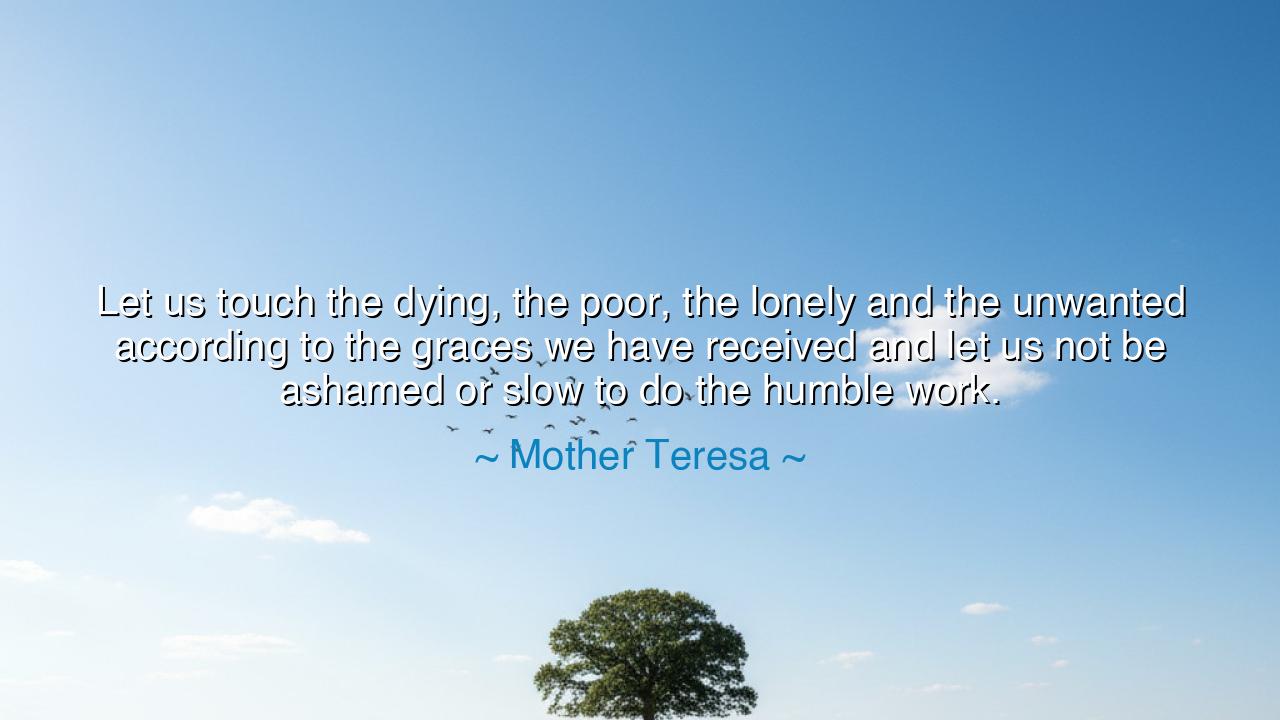
Let us touch the dying, the poor, the lonely and the unwanted
Let us touch the dying, the poor, the lonely and the unwanted according to the graces we have received and let us not be ashamed or slow to do the humble work.






Hear the holy words of Mother Teresa, servant of the least and light in the darkest places: “Let us touch the dying, the poor, the lonely and the unwanted according to the graces we have received and let us not be ashamed or slow to do the humble work.” In this saying lies the essence of compassion, that divine call to descend into the suffering of others and bring the warmth of love where the world has turned away.
She speaks first of the dying, the poor, the lonely, and the unwanted—those whom society forgets, those cast aside as burdens, those who dwell in shadows. Yet it is here, she proclaims, that our true humanity is tested. For greatness is not in crowns or achievements, but in whether we stoop low enough to lift the broken, whether we reach out our hands to those whom others refuse to touch.
Mother Teresa grounds this in the graces we have received, reminding us that every gift—health, wealth, knowledge, love—was not earned alone but entrusted to us. To hoard such graces is to betray their purpose; to share them with the least among us is to fulfill their meaning. What we have freely received, we must freely give, becoming channels of mercy in a thirsty world.
She warns also against shame or hesitation: “let us not be ashamed or slow to do the humble work.” The proud heart resists menial tasks, desiring glory and recognition, yet it is in humility that true love reveals itself. To bathe the sick, to feed the hungry, to comfort the lonely—these are the works that reflect the heart of God. In such lowly labor lies the highest calling.
Thus let this teaching endure for all generations: touch without fear, serve without delay, love without condition. The measure of a life is not in what it gains, but in whom it lifts. Mother Teresa, clothed in humility yet radiant with strength, left this wisdom as a torch for mankind—that in serving the forgotten, we serve the Eternal.






MHTrieu Minh Huyen
Mother Teresa’s words really hit home when I think about the way we view the marginalized in society. It’s easy to forget that everyone deserves our attention and care, especially those who are 'dying, poor, lonely, and unwanted.' But do we truly understand the grace we’ve received? How can we share that grace with others, particularly when the work is hard or thankless? What stops us from doing more, and how can we overcome that?
BAVu Bao Anh
This quote is a beautiful reminder that service to others doesn’t always have to be grand or visible. Sometimes, the smallest acts of kindness are the most meaningful. But how do we stay motivated to do the humble work, especially when we don’t see immediate results? Can we trust that even small, seemingly insignificant acts are still valuable? How do we develop the strength to keep serving selflessly?
PTNguyen Phuong Thao
Mother Teresa’s quote challenges us to think about our responsibility to others, especially those who are most vulnerable. It’s easy to ignore the suffering around us, but she urges us to use the gifts we have to make a real impact. How do we ensure we’re not too caught up in our own lives to help those in need? Is it possible to serve with grace, even in the most difficult situations?
BTBich Thao
This quote touches me deeply because it calls for humility and empathy. The idea of not being ashamed to help those in need, even when it’s difficult, is powerful. But why do we often hesitate when it comes to helping the less fortunate? Is it fear, pride, or something else? How do we get past these barriers and step up to do the work that truly matters, even if it feels humble?
DKduy khanh
Mother Teresa’s words really make me reflect on how we view service to others. Often, we shy away from helping those who are suffering, maybe because we feel it’s too difficult or uncomfortable. But this quote reminds us that our actions should align with the grace we’ve received. Do you think we sometimes avoid the 'humble work' because it doesn’t get recognition, or is it about not feeling equipped to help?